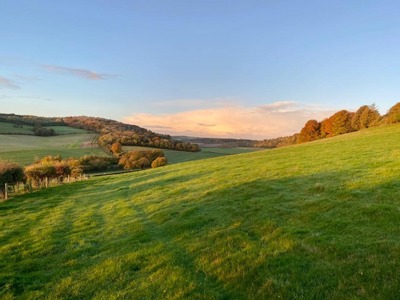
Supreme Court grants permission for major nature charity to intervene in case about protections for important wildlife habitats
The Supreme Court has granted permission for Wildlife and Countryside Link (Link) to have an independent voice standing up for nature protection interests in an important case concerning environmental protections and planning rules.
Posted on 14 February 2025
The environmental charity has been granted permission to make written submissions as an intervener in C.G. Fry & Son Limited (C.G. Fry) v Secretary of State for Levelling Up, Housing and Communities & Somerset Council.
This is a significant case for the application of “nutrient neutrality” rules that protect important rivers, coastlines and wetlands from pollution and in the legal interpretation of the Habitats Regulations. Nutrient neutrality rules require developers to avoid or offset additional pollution from development, such as phosphates and nitrates, when it would harm a wildlife site protected under the Habitats Regulations or the Ramsar Convention.
The case raises questions over whether rules apply when developments receive planning permission before the introduction of Natural England’s guidance on the issue, but further consents are needed. If the appeal is successful, hundreds of developments could proceed without addressing impacts of pollution from sewage on rivers, coastlines and wetlands.
In December 2015 C.G. Fry secured outline planning permission for a mixed-use development of up to 650 homes near Wellington, Somerset. Construction on the first two phases is under way. Plans for phase three - comprising 190 homes - were approved by Somerset West and Taunton Council in June 2020. However, pre-commencement conditions were not discharged without an assessment of the impacts of development on the Somerset Levels and Moors Ramsar site. This internationally important wetland includes natural features that are vulnerable to the harmful effects of diffuse water pollution.
The failure to assess and address water pollution and potential damage to protected nature sites means the third phase of development has been paused. C.G. Fry lodged appeals with the Planning Inspectorate, the High Court and the Court of Appeal – failing on all three occasions. CG Fry & Son has now obtained an order for permission to appeal to the Supreme Court at a hearing on 17 - 18 February 2025.
Link will make expert legal arguments on the application of the precautionary principle and statutory interpretation of the Habitats Regulations. It argues that the existing environmental protections are not a barrier to development but a necessary safeguard against harmful pollution affecting sites of international ecological significance, like the Somerset Levels and Moors.
The organisation contends that a purposive (what was intended by the law) and precautionary legal approach - which aligns with both UK and retained EU environmental law - requires such assessments to ensure that new developments do not worsen biodiversity loss and pollution in protected areas.
Link will make the following submissions:
- The Habitats Directive and retained EU law interpreting its provisions continue to be relevant to deciding the case.
- The precautionary principle, forming the foundation of the Habitats Regulations, should be a central consideration in decision-making. This principle exists both within retained EU law and as a freestanding principle of domestic environmental law.
- A ‘purposive’ approach to statutory interpretation should be applied, ensuring legal provisions are interpreted in a way that best serves their environmental protection objectives.
- Applying these principles, an appropriate assessment under the Habitats Regulations may be required when a planning authority decides whether to discharge pre-commencement conditions.
- A ruling in favour of the developer could undermine the long-standing practice of using pre-commencement “Grampian” conditions to ensure compliance with the Habitats Regulations.
- The developer’s concerns regarding the Court of Appeal’s approach to material considerations are unfounded and misconceived.
Ricardo Gama said:
“This case is of vital importance for the protection of our most vulnerable natural habitats. The precautionary principle is a cornerstone of environmental law, ensuring that developments do not cause irreparable harm to protected sites. The Supreme Court has an opportunity to uphold robust environmental safeguards, reinforcing the necessity of thorough assessments to prevent pollution and biodiversity loss. We are pleased to represent Wildlife and Countryside Link in making these crucial arguments to the Supreme Court.”
Richard Benwell, CEO of Wildlife and Countryside Link, said:
“With so much development on the horizon, it’s vital that the Habitats Regulations aren’t reduced to a one-shot bit of tick box bureaucracy. They are integral to the whole planning process, protecting wildlife and helping ensure that sustainable development and nature recovery can both be achieved.
“We hope that the Supreme Court will underscore the core purpose of the law to strictly safeguard protected species and habitats when pollution or biodiversity loss hit unacceptable limits. We hope developers realise that the best route to sustainable development is helping to restore nature, not questioning the laws that protect our rivers and wetlands from pollution.”
Joan Edwards, Director of Policy & Public Affairs at The Wildlife Trusts, said:
“The Habitat Regulations are there for a reason, to protect the most precious and threatened wild spaces and species, and to preserve the benefits they provide for everyone. We welcome the decision to allow environmental experts to highlight this in the Fry case.
“More broadly, as discussions continue about development and nature restoration, it is important to remember that both can and should be delivered in tandem, and that green infrastructure is just as important as built infrastructure to our quality of life. We can have new development and flourishing wild spaces, to the benefit of all, if important environmental protections are respected.”




